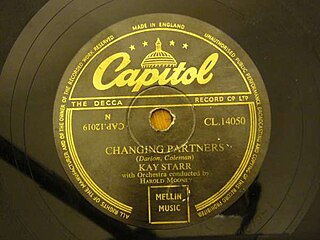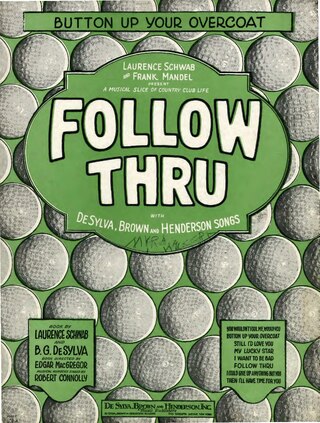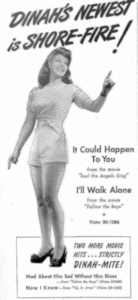Easy listening is a popular music genre and radio format that was most popular during the 1950s to the 1970s. It is related to middle of the road (MOR) music and encompasses instrumental recordings of standards, hit songs, non-rock vocals and instrumental covers of selected popular rock songs. It mostly concentrates on music that pre-dates the rock and roll era, characteristically on music from the 1940s and 1950s. It was differentiated from the mostly instrumental beautiful music format by its variety of styles, including a percentage of vocals, arrangements and tempos to fit various parts of the broadcast day.
"Because" is a song with music and lyrics by Guy d'Hardelot and English lyrics by Edward Teschemacher, originally published in 1902.

"Secret Love" is a song composed by Sammy Fain (music) and Paul Francis Webster (lyrics) for Calamity Jane, a 1953 musical film in which it was introduced by Doris Day in the title role. Ranked as a number 1 hit for Day on both the Billboard and Cash Box, the song also afforded Day a number 1 hit in the UK. "Secret Love" has subsequently been recorded by a wide range of artists, becoming a C&W hit firstly for Slim Whitman and later for Freddy Fender, with the song also becoming an R&B hit for Billy Stewart, whose version also reached the top 40 as did Freddy Fender's. In the UK, "Secret Love" would become the career record of Kathy Kirby via her 1963 remake of the song. The melody bears a slight resemblance to the opening theme of Schubert's A-major piano sonata, D.664.
"If I Give My Heart to You" is a popular song written by Jimmy Brewster, Jimmie Crane, and Al Jacobs. The most popular versions of the song were recorded by Doris Day and by Denise Lor; both charted in 1954.

"Changing Partners" is a pop song with music by Larry Coleman and lyrics by Joe Darion, published in 1953. The best-known recording was made by Patti Page. It was also recorded the same year by Dinah Shore, Kay Starr and Bing Crosby.
"Red Sails in the Sunset" is a popular song. Published in 1935, its music was written by Hugh Williams with lyrics by prolific songwriter Jimmy Kennedy. The song was inspired by the "red sails" of Kitty of Coleraine, a yacht Kennedy often saw off the northern coast of Northern Ireland and by his adopted town Portstewart, a seaside resort in County Londonderry.
"All I Do Is Dream of You" is a popular song. The music was written by Nacio Herb Brown, the lyrics by Arthur Freed. The song was published in 1934. It was originally written for the Joan Crawford film Sadie McKee (1934) when it was played during the opening credits and later sung by Gene Raymond three times. It was also sung in the film by Earl Oxford in a show. The song is also featured in the films Singin' in the Rain, A Night at the Opera, The Affairs of Dobie Gillis, and Crimes and Misdemeanors.

"Button Up Your Overcoat" is a popular song. The music was written by Ray Henderson, the lyrics by B.G. DeSylva and Lew Brown. The song was published in 1928, and was first performed later that same year by vocalist Ruth Etting. However, the most famous rendition of this song was recorded early the following year by singer Helen Kane, who was at the peak of her popularity at the time. Kane's childlike voice and Bronx dialect eventually became the inspiration for the voice of cartoon character Betty Boop.
"It's Easy to Remember " is a popular song written by Richard Rodgers with lyrics by Lorenz Hart.
"I've Got the World on a String" is a 1932 popular jazz song composed by Harold Arlen, with lyrics written by Ted Koehler. It was written for the twenty-first edition of the Cotton Club series which opened on October 23, 1932, the first of the Cotton Club Parades.

"I'll Walk Alone" is a 1944 popular song with music by Jule Styne and lyrics by Sammy Cahn. The song was written for the 1944 musical film Follow the Boys, in which it was sung by Dinah Shore, and was nominated for the Academy Award for Best Original Song but lost to “Swinging on a Star”. Shore recorded the song in March as a single, which became her first #1 hit on the Billboard charts.
"Moonlight Becomes You" is a popular song composed by Jimmy Van Heusen with lyrics by Johnny Burke. The song was written for the Paramount Pictures release Road to Morocco (1942) and published in 1942 in connection with the film. Vic Schoen wrote the arrangement.
"Far Away Places" is an American popular song. It was written by Joan Whitney and Alex Kramer and published in 1948.
"I've Got a Crush on You" is a song composed by George Gershwin, with lyrics by Ira Gershwin. It is unique among Gershwin compositions in that it was used for two different Broadway productions: Treasure Girl (1928), when it was introduced by Clifton Webb and Mary Hay, and Strike Up the Band (1930), when it was sung by Doris Carson and Gordon Smith. It was later included in the tribute musical Nice Work If You Can Get It (2012), in which it was sung by Jennifer Laura Thompson. When covered by Frank Sinatra he was a part of Columbia Records.
"Love Walked In" is a song composed by George Gershwin, with lyrics by Ira Gershwin. The tune was composed in 1930, but the lyric was not written until 1937, for the movie musical The Goldwyn Follies (1938), where it was sung by Kenny Baker. Hit versions include Sammy Kaye (1938), The Hilltoppers (1953), Ella Fitzgerald (1959), The Flamingos (1959) and Dinah Washington (1960). Artie Shaw recorded the song in the early 1940s.

"Nobody's Sweetheart", also known as "Nobody's Sweetheart Now" and "You're Nobody's Sweetheart Now", is a popular song, written in 1924, with music by Billy Meyers and Elmer Schoebel, and lyrics by Gus Kahn and Ernie Erdman. The song is a jazz and pop standard.
"Now It Can Be Told" is a popular song written by Irving Berlin for the 1938 film Alexander's Ragtime Band, where it was introduced by Alice Faye and Don Ameche. It was nominated for an Academy Award in 1938 but lost out to "Thanks for the Memory".
"I Let a Song Go Out of My Heart" is a 1938 composition by Duke Ellington, with lyrics added by Irving Mills, Henry Nemo and John Redmond. The song became a number one hit for Ellington in 1938. Other hit versions the same year were by Benny Goodman, Jimmy Dorsey, Connee Boswell, Hot Lips Page, and Mildred Bailey. It was performed as part of The Cotton Club Parade of 1938.
"Say It Isn't So" is a popular torch song by Irving Berlin, published in 1932. The song was written when Berlin was suffering a loss of confidence following several setbacks, and he initially placed the song in a drawer, feeling that it would not be successful. However, one of Berlin's employees, Max Winslow, heard it, and on his own initiative, took it to Rudy Vallée, who was then a major star on radio. Vallee sang it on his radio show and it became an immediate hit.

"Remember" is a popular song about nostalgia by Irving Berlin, published in 1925. The song is a popular standard, recorded by numerous artists.





